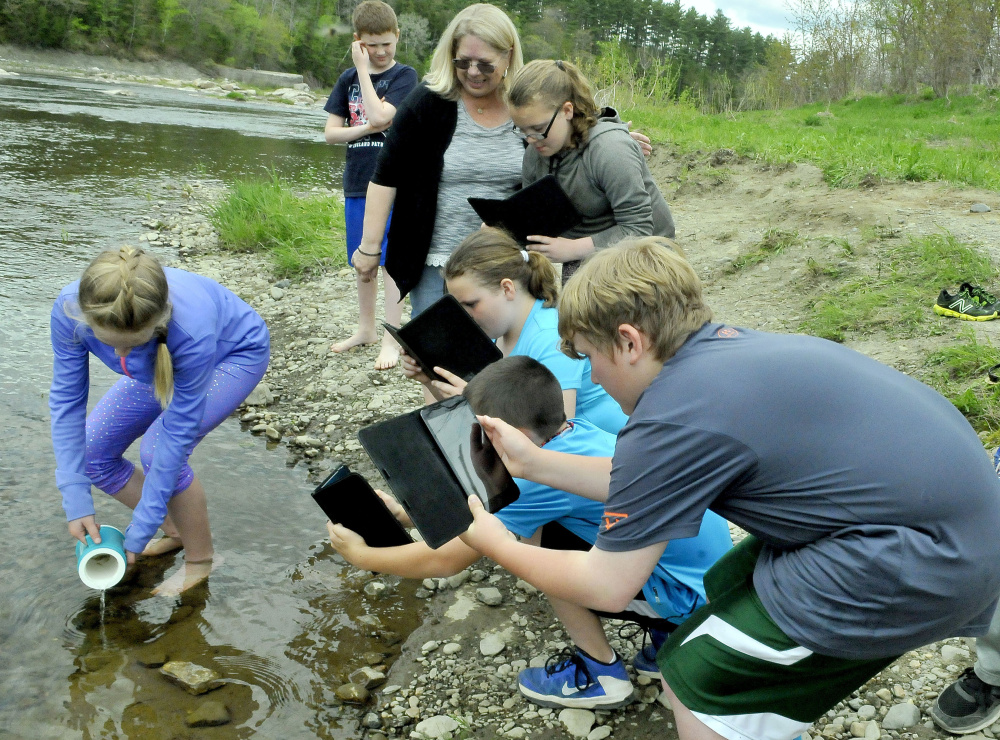NORRIDGEWOCK — Ashlee Clough rolled up the bottoms of her pants Thursday afternoon, pulled off her sneakers and slowly waded into the chilly Sandy River.
She slowly tipped over the cooler she was holding, letting several dozen young salmon – known as fry – swim into the river.
“Say bye, guys,” said her teacher, Patricia Dunphy. “Bye,” echoed Clough and nine of her Madison Junior High School classmates as they stood on the shore and watched.
Thursday marked the final day of a months-long project for the fifth-graders, who began raising the salmon in February.
“It’s the last final hurrah,” said Dunphy, a fifth-grade science teacher. “We’ve studied them for the last three months, and now it’s time to release them.”
The project is part of the Atlantic Salmon Federation’s Fish Friends program, an educational program that teaches students about the salmon and how to care for them. The students learn about the life cycle of the fish, migration, the effects of river pollution and dams and other factors affecting their population.
“It’s really fun getting to interact with (the fish) and see them grow,” said Clough, 10. “It’s just a little bit of work because you have to take the temperature of the water, but it’s pretty easy.”
After three months, the students release the fry into local rivers and streams such as the Sandy River, which is also the site of a larger Atlantic salmon restoration effort run by the Maine Department of Marine Resources. The department stocks 500,000 to 1 million salmon eggs in the Sandy River each year. The students released 84 fry Thursday.
“It’s great education and outreach for bringing the next generation up to speed on the importance of anadromous fish,” said Paul Christman, a marine scientist for the Maine Department of Marine Resources heading up restoration efforts on the Sandy River.
Salmon have been extinct in the Sandy River since the early 1800s, Christman said. He said their decline has largely been attributed to the construction of the Edwards Dam in Augusta. When the dam was removed in 1999, biologists started Atlantic salmon restoration efforts and have been releasing increasing numbers of fish in the river over the last 15 years.
Still, Atlantic salmon in Maine remain endangered, and they aren’t returning to rivers at a high enough rate to sustain a population.
That’s where the Fish Friends program comes in, Dunphy said.
“It’s teaching the kids to have an awareness of the animals and things in Maine that need to be protected,” she said.
Rachel Ohm can be contacted at 612-2368 or at:
rohm@centralmaine.com
Twitter: @rachel_ohm
Copy the Story LinkSend questions/comments to the editors.




Success. Please wait for the page to reload. If the page does not reload within 5 seconds, please refresh the page.
Enter your email and password to access comments.
Hi, to comment on stories you must . This profile is in addition to your subscription and website login.
Already have a commenting profile? .
Invalid username/password.
Please check your email to confirm and complete your registration.
Only subscribers are eligible to post comments. Please subscribe or login first for digital access. Here’s why.
Use the form below to reset your password. When you've submitted your account email, we will send an email with a reset code.